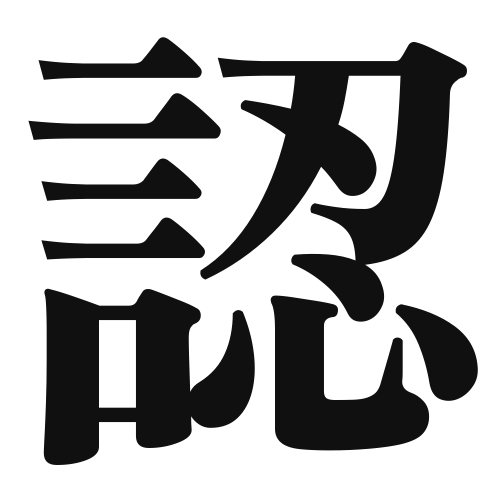1. Overview of Meaning
The kanji “認” (pronounced “nin” or “shinji”) primarily means “to recognize,” “to acknowledge,” or “to admit.” It conveys the idea of understanding or accepting something as true or valid.
2. Formation and Radicals
The kanji “認” is a compound character, formed by combining the radicals for “words” (言) and “to know” (日). This combination suggests the act of acknowledging or recognizing something through verbal expression.
The radical for “認” is 言 (gen), which relates to speech or words, emphasizing the importance of communication in the act of recognition.
3. Examples of Usage
Common words and phrases that include “認” are:
- 認識 (にんしき, ninshiki) – recognition, awareness
- 認可 (にんか, ninka) – approval, authorization
- 認証 (にんしょう, ninshou) – certification, authentication
Example sentences in daily conversation:
- 彼は自分の間違いを認めた。 (かれはじぶんのまちがいをみとめた。) – He acknowledged his mistake.
- この証明書は公式に認証されています。 (このしょうめいしょはこうしきににんしょうされています。) – This certificate is officially certified.
4. Synonyms and Antonyms
Similar kanji with related meanings include:
- 承認 (しょうにん, shounin) – approval, which emphasizes consent or agreement.
- 認識 (にんしき, ninshiki) – recognition, focusing on awareness or understanding.
Antonyms include:
- 否認 (ひにん, hinin) – denial, which means to refuse to acknowledge or accept something.
5. Cultural and Historical Background
The kanji “認” is deeply rooted in Japanese culture, where acknowledgment and recognition play significant roles in social interactions and relationships. It reflects the importance of communication and understanding in Japanese society.
Proverbs and idiomatic expressions that include “認” are:
- 認める者は、成長する (みとめるものは、せいちょうする) – Those who acknowledge will grow, emphasizing the value of recognizing one’s mistakes or learning from experiences.
